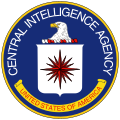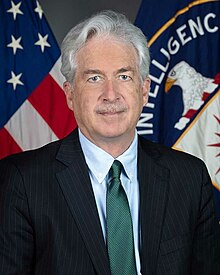Director of the Central Intelligence Agency
| Director of the Central Intelligence Agency | |
|---|---|
 Seal of the Central Intelligence Agency | |
 Flag of the Central Intelligence Agency | |
| Central Intelligence Agency | |
| Abbreviation | D/CIA |
| Reports to | Director of National Intelligence (DNI) |
| Seat | George Bush Center for Intelligence, Langley, Fairfax County, Virginia |
| Appointer | President of the United States with Senate advice and consent |
| Term length | No fixed term |
| Constituting instrument | 50 U.S.C. § 3036 |
| Precursor | Director of Central Intelligence |
| Formation | April 21, 2005 |
| First holder | Porter J. Goss |
| Deputy | Deputy Director of the Central Intelligence Agency (DD/CIA) |
| Salary | Executive Schedule, Level II[1] |
| Website | www |
The director of the Central Intelligence Agency (D/CIA) is a statutory office (50 U.S.C. § 3036) that functions as the head of the Central Intelligence Agency, which in turn is a part of the United States Intelligence Community.
Beginning February 2017, the D/CIA was elevated to Cabinet of the United States level status, as designated by the president of the United States. This ended with the beginning of the Biden administration.[2]
The director reports to the director of national intelligence (DNI) and is assisted by the deputy director of the Central Intelligence Agency (DD/CIA). The director is a civilian or a general or flag officer of the United States Armed Forces[3] nominated by the president of the United States, with the recommendation from the DNI,[4] and must be confirmed by a majority vote of the United States Senate.[5]
History[]
Before April 21, 2005, the director of Central Intelligence (DCI) headed both the Intelligence Community and the Central Intelligence Agency. In addition, DCI served as an advisor to the president of the United States on intelligence matters and was the statutory intelligence advisor to the National Security Council (NSC). On April 21, 2005, the director of national intelligence (DNI) took on the roles as head of the Intelligence Community and principal intelligence advisor to the president and the NSC.
The post of DCI was established in 1946 by President Harry S. Truman;[6] it thus predates the establishment of the Central Intelligence Agency (created by the National Security Act of 1947). After the end of World War II, the Office of Strategic Services was dismantled and its functions were split between the departments of state and war (now defense).[7] President Truman soon recognized the inefficiency of this arrangement and created the Central Intelligence Group,[8] which could be considered a smaller precursor to the National Security Council.[9] The following year the National Security Act of 1947 created the Central Intelligence Agency and National Security Council, while formally defining the duties of the director of Central Intelligence. The duties of the DCI had been further defined over the years by tradition, congressional acts, and Executive Orders.
Order of succession[]
The order of succession determines which official shall act and perform the functions and duties of the director in the event he or she dies, resigns, or otherwise becomes unable to perform their duties. The official will serve as Acting Director.
If the official is already serving in an acting capacity, or he or she is otherwise not eligible under the Federal Vacancies Reform Act of 1998, the order skips to the next person in line. However, the president of the United States retains discretion to depart from the list in designating an acting director.[10]
| No. | Title |
|---|---|
1
|
Deputy Director |
2
|
Chief Operating Officer |
3
|
Deputy Director of CIA for Operations |
4
|
Deputy Director of CIA for Analysis |
5
|
Deputy Director of CIA for Science and Technology |
6
|
Deputy Director of CIA for Digital Innovation |
7
|
Deputy Director of CIA for Support |
8
|
General Counsel |
9
|
Deputy Chief Operating Officer |
10
|
Senior CIA Representative for the United Kingdom |
11
|
Senior CIA Representative for the East Coast |
12
|
Senior CIA Representative for the West Coast |
List of directors[]
| No. | Director | Tenure | President(s) served under | ||
|---|---|---|---|---|---|
| Position succeeded the Director of Central Intelligence. | |||||
| 1 | 
|
Porter Goss | April 21, 2005 – May 5, 2006[11] | George W. Bush | |
| 2 | 
|
General Michael Hayden |
May 30, 2006 – February 12, 2009[12] | ||
| Barack Obama | |||||
| 3 | 
|
Leon Panetta | February 13, 2009 – June 30, 2011[13] | ||
| – | 
|
Michael Morell Acting |
July 1, 2011 – September 6, 2011 | ||
| 4 | 
|
David Petraeus | September 6, 2011 – November 9, 2012[14] | ||
| �� | 
|
Michael Morell Acting |
November 9, 2012 – March 8, 2013 | ||
| 5 | 
|
John Brennan | March 8, 2013 – January 20, 2017[15] | ||
| – | 
|
Meroe Park Acting |
January 20, 2017 – January 23, 2017 | Donald Trump | |
| 6 | 
|
Mike Pompeo | January 23, 2017 – April 26, 2018[16] | ||
| 7 | 
|
Gina Haspel | April 26, 2018 – May 21, 2018 | ||
| May 21, 2018 – January 20, 2021 | |||||
| – | 
|
David Cohen Acting |
January 20, 2021 – March 19, 2021 | Joe Biden | |
| 8 | 
|
William J. Burns | March 19, 2021 – Present | ||
Living former directors of Central Intelligence Agency[]
As of December 2021, there are seven living former directors of Central Intelligence Agency (with all directors that have served since 2005 still living), the oldest being Leon Panetta (served 2009–2011, born 1938).
- Living former Directors of Central Intelligence Agency

Porter Goss
served 2005–2006, born November 26, 1938 (age 83)
Michael Hayden
served 2006–2009, born March 17, 1945 (age 76)
Leon Panetta
served 2009–2011, born June 28, 1938 (age 83)
David Petraeus
served 2011–2013, born November 7, 1952 (age 69)
John Brennan
served 2013–2017, born September 22, 1955 (age 66)
Mike Pompeo
served 2017–2018, born December 30, 1963 (age 57)
Gina Haspel
served 2018–2021, born October 1, 1956 (age 64)
See also[]
- Chief, IRS Criminal Investigation
- Director of the Federal Bureau of Investigation
- Director of the United States Marshals Service
- Director of the United States Secret Service
References[]
- ^ 5 U.S.C. § 5313
- ^ "The Cabinet". www.whitehouse.gov/. Retrieved February 3, 2021.
- ^ 10 U.S.C. § 528 Officers serving in certain intelligence positions: military status; exclusion from distribution and strength limitations; pay and allowances
- ^ 50 U.S.C. § 403-6 Appointment of officials responsible for intelligence-related activities
- ^ 50 U.S.C. § 3036 Director of the Central Intelligence Agency
- ^ "A Look Back … The National Security Act of 1947 — Central Intelligence Agency". www.cia.gov. Archived from the original on May 8, 2019. Retrieved February 6, 2017.
- ^ "Office of Strategic Services facts, information, pictures | Encyclopedia.com articles about Office of Strategic Services". www.encyclopedia.com. Retrieved February 6, 2017.
- ^ "The Organizational Arrangements for the Intelligence Community". www.gpo.gov. Retrieved February 6, 2017.
- ^ "Truman signs the National Security Act - Jul 26, 1947 - HISTORY.com". HISTORY.com. Retrieved February 6, 2017.
- ^ www.whitehouse.gov
- ^ "Porter Johnston Goss". Central Intelligence Agency – Library. Archived from the original on September 23, 2020. Retrieved February 22, 2017.
- ^ "Michael Vincent Hayden". Central Intelligence Agency – Library. Archived from the original on August 4, 2019. Retrieved February 22, 2017.
- ^ "Leon Edward Panetta". Central Intelligence Agency – Library. Archived from the original on August 4, 2019. Retrieved February 22, 2017.
- ^ "David Howell Petraeus". Central Intelligence Agency – Library. Archived from the original on August 4, 2019. Retrieved February 22, 2017.
- ^ "John O. Brennan". Central Intelligence Agency – Leadership. Archived from the original on July 22, 2019. Retrieved February 25, 2017.
- ^ "Mike Pompeo". Central Intelligence Agency – Leadership.
- Directors of the Central Intelligence Agency
- 2005 establishments in the United States








